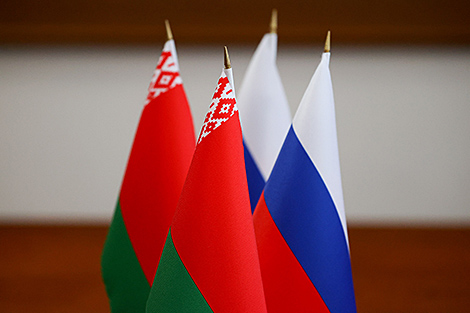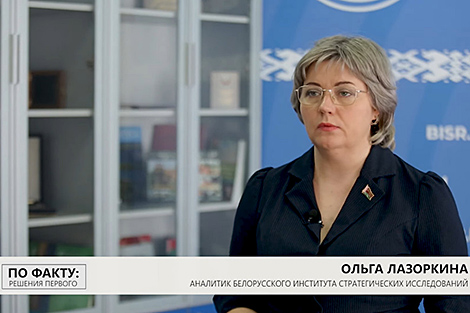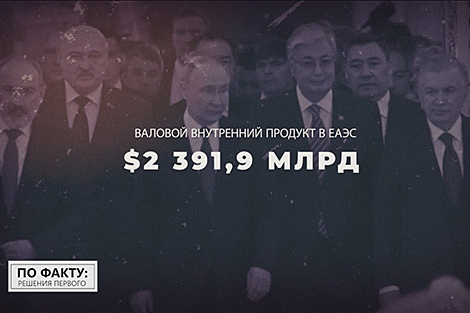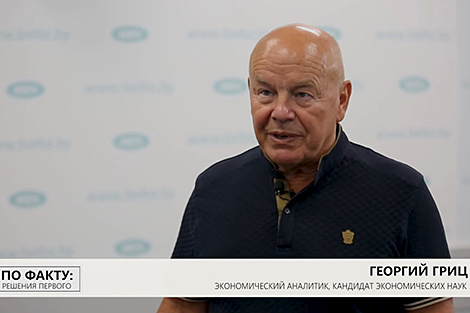News & Events in Belarus
Lukashenko debunks myths about Belarus-Russia Union State: No coercion or absorption

An archive photo
In the post-Soviet space, there are several international associations with different levels of integration. The largest in terms of participants is the Commonwealth of Independent States. One of the main principles of the CIS is a free trade zone. A more advanced structure is the Eurasian Economic Union. The EAEU countries pursue a coordinated, coherent or unified policy in various sectors of the economy. But the Union State of Belarus and Russia has gained the largest momentum in terms of integration. Two sovereign and independent states have been able to build a close association and together they confidently overcome any challenges. This was confirmed by the recent official visit of Vladimir Putin to Belarus.
In the new episode of BelTA's YouTube project “After the Fact: Lukashenko's Decisions”, we will tell you whether we should believe the myths about the Belarus-Russia integration and whether Lukashenko and Putin are discussing who will take the post of the president of the Union State, how the union of Belarus and Russia differs from the European Union and what closer integration between our countries will actually lead to.
Ground zero
Belarus and Russia began to restore economic ties in the mid-1990s. The first years after the collapse of the Soviet Union showed that it would be impossible to live on different sides of the barricades. The Agreement on the Customs Union of Russia and Belarus was signed in January 1995. A month later the countries concluded a treaty of friendship, good-neighborliness and cooperation. In April 1996, the Community of Belarus and Russia was formed, and exactly a year later the countries entered into a union. True, the political and economic processes that were taking place in both states at that time prevented the countries from fully engaging in integration. The turning point came in the late 1990s. On 8 December 1999, the presidents of Belarus and Russia signed the Union State Treaty.
What did it lead to? The trade between Belarus and Russia in 1999-2008 increased fivefold (from $7 billion to almost $35 billion). The number of Russian regions with which Belarus cooperates increased from 6 to 88.
"Starting to develop our union with Yeltsin in the mid-1990s, we clearly determined that these would be two countries - Belarus and Russia that would build a union. It would be more powerful than a unitary state," Aleksandr Lukashenko said in a BBC interview in 2021.

It is noteworthy that foreign journalists always ask the president about the status of Belarus-Russia integration. Surely, they have a reason to be curious.
What makes the Union State strong?
The union of Belarus and Russia has an ethnic and economic basis. The countries pursue a concerted foreign policy and have a common defense space. It is very important that the parties were able to create a common humanitarian and cultural dimension ensuring equal conditions for their citizens.Now, due to close integration, there is no border between Belarus and Russia, there are no restrictions on the freedom of movement, transportation of goods and services, change of residence, employment and education for citizens of the Union State. We have mutually recognized pension schemes; we have ensured equal rights of our citizens for healthcare and social security benefits. And this is only part of the “social convergence” program that was implemented by Russia and Belarus. Yet, we are so used to it that we have taken this for granted.

“Today the Union State addresses several problems at a time, thus it would be wrong to reduce it to the level of bilateral relations. I would look at the Union State through the lens of multipolarity. We see that multipolarity is inevitable, so we need to harness this trend and even shape it. Unless we take a pro-active stance, someone else will do it for us, like it was before,” said Olga Lazorkina, analyst at the Belarusian Institute for Strategic Research. Opponents of the Union State are trying to shift the focus on completely different topics. Perhaps the number one myth about Belarus-Russia integration has to do with the possibility of a takeover. They say that Russia wants to subjugate Belarus. Vladimir Putin once emphasized: our key goal is a coordinated economic policy, everything else are just attempts by ill-wishers to slow down the integration process in order to keep formidable competitors away from global markets.
“We are witnessing the formation of a new world order, and it will most likely be based not on global rules, but on regional rules, on the regional development agenda. From this point of view, the Union State can be the core of a long-term regional development policy,” economist Georgy Grits said.
He believes that troublemaker countries will eventually understand that they should pursue their national interest taking into consideration the regional context. “They should not rely on friends from abroad, especially those across the ocean. These friends from overseas have completely different interests: to create a colony, expand sales markets, gain access to raw materials and, as a result, get out of the crisis in which Western countries have found themselves today. This is also one of the factors, one of the threats facing the post-Soviet space," the expert said.
Does the Union State put limitations on the sovereignty of Belarus and Russia?
Let's look at the Union State Treaty. “The Union State is based on the principle of sovereign equality of the participating states.” “Each party retains its sovereignty, independence, territorial integrity, and system of government.” “The official languages of the Union State are the official languages of the participating states.” Is there anything here that suggests the loss of sovereignty?
Indeed, the provision on the single currency caused a lot of controversy. Yet, the same document notes that the goals of the Union State shall be achieved in stages, with a focus on addressing economic and social problems. The introduction of the single currency is not high on the agenda today. Therefore, all talks about the takeover are based on far-fetched premises, as the Russian president noted.
How to retain sovereignty in the integration with a superpower?
“When Yeltsin and I signed the agreement, we implied that it would not be the Belarusian ruble or the Russian ruble, but some other currency. Yet, since our currency is called a ruble, and your currency is also called a ruble, why would we invent something else and call the single currency a thaler or something. Yes, it will be a ruble. Another thing is the conditions on which the currency issuing center will operate. Let’s do it like in the European Union. It must be independent. It must not be Russian. This is a higher level of integration which we have not approached. When we approach it, we will take a decision," the president said in an interview with Rossiya Segodnya in 2021.
Will the Union State have its own president?
What about the introduction of the post of the Union State president? This is not mentioned in any effective document. Moreover, Aleksandr Lukashenko and Vladimir Putin do not even raise this topic.
“As for the matter of one president or two presidents… I swear we’ve never discussed this matter with Putin. Never. Because such a matter is not on the agenda,” the president told BBC. True, the draft Constitutional Act of the Union State suggests that the Supreme State Council will be the governing body. But the two presidents will get a turn at holding this post on a rotating basis. The Supreme State Council is still the highest body of the Union State. The council includes presidents, heads of government, and parliament speakers. Since 26 January 2000 (this is the day when the Union State Treaty came into force), it has been presided by the Belarusian leader.

“If someone in Russia, and also here in Belarus, thinks that the Union State means that we will unite tomorrow and the new entity will be governed by the Kremlin, and so on, I want to tell them the following. Listen, I am an 'outgoing' president (I often say this), but I am absolutely convinced that no matter who takes over after me, this idea will not be supported. We are smart people. We have built a union of sovereign, independent states to make us stronger. We need to go further and calmly solve emerging issues,” Aleksandr Lukashenko told the media.
What are the prospects of Belarus-Russia integration?
Belarus and Russia have recently witnessed a considerable improvement in relations. The level of interaction and trust between the two countries is unprecedented across the board. Minsk and Moscow are committed to supporting each other in all the areas. Some of joint projects have even defied gravity to explore the vastness of space.
“Within the Union State we are building a new model of economic interaction in asymmetric conditions. After all, the economies of Belarus and Russia are completely different in terms of size and resource base. Most often it is not about equal relations, but about how the countries can interact in such conditions. Here it is crucial to choose the optimal model. Belarus has found such a model,” Olga Lazorkina, an analyst at the Belarusian Institute for Strategic Research, said.
According to her, it is wrong to say that we were moving slowly. We made considerable progress in advancing the economic integration “Finding a model to meet national interests is crucial. This is of great importance for Belarus. Today we can describe the union as a model that can be scaled up. After all, sovereignty is the basis for the post-Soviet countries. Is it possible to interact with a great power while preserving sovereignty? Yes, it is. We have proved it,” the expert stressed.

A new stage of economic integration is the implementation of almost 30Union State programs. The documents were adopted at the Supreme State Council summit in November 2021. These programs lay foundation for even closer cooperation, largely aligning the economies of the two countries, removing obstacles to creating a level-playing field. The Union State programs are a kind of a joint economic restart. Import-substituting projects in microelectronics, mechanical engineering, machine-tool industry, military-technical cooperation will help the Union State to ensure technological sovereignty and economic security. A lot has already been done. But a lot of work is still ahead. The main thing is that there are no unsolvable issues in bilateral relations. Both leaders confirm this.
Comparing Union State to European Union
Experts believe that the Union State resembles the current European Union, and even surpasses it in terms of integration. We have our own advantages. Belarusian-Russian interaction is constructive, based on respect and equality in achieving both private and common interests. This is what Western partners actually lack.
Turkish journalists asked Aleksandr Lukashenko the same question, whether the Union State will be similar to the European Union.
“No,” the president replied.
He explained his position by saying that the union between Belarus and Russia will be more advanced and more stable. “First, we will learn from mistakes of the European Union. We will adopt its best practices, too. Secondly, we ourselves come from a single state - the Soviet Union. It left us a mixed legacy. We know what things from the Soviet past we should draw on and what we should discard. Therefore, this will be a more powerful, well-thought and advanced union,” the head of state said.
An economist Georgy Grits mentioned the main problem of the European Union. As a result of evolution, it gave rise to a whole clan, the so-called Brussels eurocrats. In many respects, the interests that Brussels formalizes, upholds or defines are in conflict with the interests of the EU countries.

“We see (again at the level of sanctions policy): companies, countries have lost not even billions, but percentages of their national wealth. Therefore, the format that Aleksandr Lukashenko spoke about 10 to 15 years ago after the Union State was established is now supported by Vladimir Putin. These are two sovereign states and a single economy. This know-how, as I would describe it, is the basis of the Union State. Today we see not just coordination in terms of economy, trade, customs policy but cooperative relations in the Union State. This is the trend that is not even fully present in the EU countries,” Georgy Grits said.
Key to success of Belarus-Russia Union State
What lies behind the success of the Union State? In our opinion, everything is simple here. The union of Belarus and Russia is not a political project. It was a bottom-up grassroots project that was later supported at the political level. Therefore, there is only one answer to this question: Belarusians and Russians feel the kinship and do not intend to forget or abandon it. Although sometimes it is not easy even for kindred souls to get along.
“Strong sovereign states, a strong union. This is the formula for the success of any integration association. Time has pushed Belarus and Russia to take on the most important problem. We intend to achieve technological sovereignty within the framework of the Union State while preserving national interests. We are confidently moving towards the goal. Our union is a union of sovereign peoples. This model has a chance of success and expansion. I emphasize: no coercion and no absorption!” Aleksandr Lukashenko said at the 7th Belarusian People’s Congress.







 print version
print version make home page
make home page add to bookmarks
add to bookmarks

